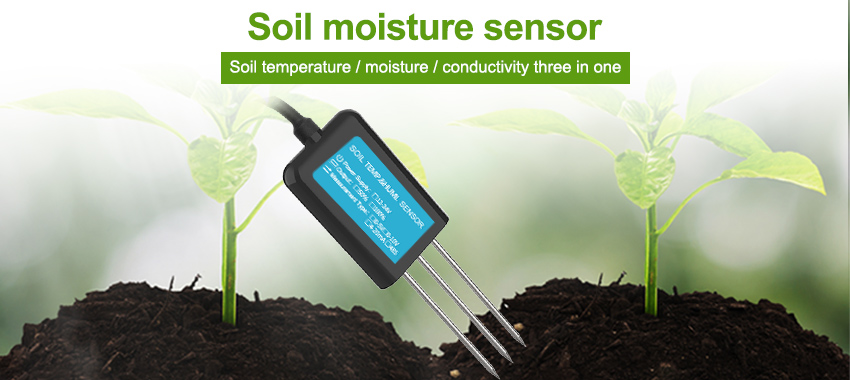Soil, a vital component of our ecosystem, plays a crucial role in sustaining agriculture and supporting food production. However, the increasing demands for food, coupled with climate change and land degradation, pose significant challenges to maintaining soil health and productivity. In this article, we explore the transformative impact of soil sensors on sustainable agriculture. These innovative devices offer real-time data, precision insights, and improved resource management, enabling farmers to make informed decisions, optimize yields, and promote long-term environmental stewardship.

Understanding Soil Health:
Soil sensors provide a deeper understanding of soil health by continuously monitoring key parameters such as moisture content, temperature, nutrient levels, pH balance, and salinity. This real-time data allows farmers to assess soil conditions accurately, identify potential issues, and implement targeted interventions. By understanding the specific needs of their soil, farmers can optimize irrigation, fertilization, and other management practices, ultimately enhancing crop growth and productivity.
Precision Farming and Resource Optimization:
The integration of soil sensors with advanced technologies like Geographic Information Systems (GIS) and Global Positioning Systems (GPS) enables precision farming. Farmers can create detailed soil maps and generate site-specific recommendations based on the sensor data. This precise approach allows for optimal resource allocation, reducing the use of water, fertilizers, and pesticides, and minimizing environmental impact. By maximizing resource efficiency, farmers can achieve higher yields while reducing costs and minimizing negative ecological consequences.
Early Detection of Soil Issues:
Soil sensors play a critical role in the early detection of soil-related issues such as nutrient deficiencies, soil erosion, compaction, and diseases. By alerting farmers to these problems in real-time, sensors enable prompt intervention, preventing yield losses and minimizing the need for reactive measures. Early detection also facilitates proactive soil management strategies, such as cover cropping, crop rotation, and conservation tillage, which promote long-term soil health and sustainability.
Climate Change Adaptation:
Climate change poses significant challenges to agriculture, including altered rainfall patterns, increased temperatures, and more frequent extreme weather events. Soil sensors help farmers adapt to these changes by monitoring soil moisture levels and providing insights into irrigation requirements. This data-driven approach allows for efficient water management, ensuring crops receive adequate hydration while minimizing water wastage. Additionally, soil sensors aid in optimizing planting schedules, allowing farmers to align their practices with changing climate conditions.
Enhanced Nutrient Management:
Proper nutrient management is essential for sustainable agriculture. Soil sensors enable precise monitoring of nutrient levels, allowing farmers to apply fertilizers in a targeted and balanced manner. By avoiding over-application, farmers reduce the risk of nutrient runoff into water bodies, mitigating water pollution concerns. Furthermore, sensor data can guide the use of organic amendments, cover crops, and crop rotation strategies, fostering natural nutrient cycling and reducing reliance on synthetic fertilizers.
Promoting Soil Regeneration and Conservation:
Soil degradation is a pressing issue globally, leading to reduced fertility, erosion, and loss of biodiversity. Soil sensors support efforts to regenerate and conserve soils by providing insights into soil health over time. By monitoring indicators such as organic matter content, microbial activity, and compaction levels, farmers can assess the effectiveness of soil conservation practices and adjust their strategies accordingly. This promotes the adoption of sustainable soil management techniques, such as agroforestry, terracing, and contour plowing.
Data-Driven Decision Making:
The wealth of data provided by soil sensors empowers farmers to make informed decisions based on scientific evidence. Analyzing historical data trends helps identify patterns and optimize farming practices over multiple seasons. This data-driven approach facilitates adaptive management, enabling farmers to respond effectively to changing conditions and improve long-term productivity and sustainability. Furthermore, the integration of data analytics and machine learning algorithms holds the potential to unlock deeper insights and predictive capabilities, further enhancing decision-making processes.
Farmer Empowerment and Knowledge Sharing:
Soil sensors not only provide valuable information to individual farmers but also contribute to collective knowledge sharing and collaboration. By sharing data and experiences, farmers can collectively address common challenges, share best practices, and develop region-specific strategies. This collaborative approach fosters innovation, resilience, and community engagement in sustainable agriculture.

Challenges and Future Directions:
While soil sensors offer immense potential, certain challenges need to be addressed for widespread adoption. These include sensor calibration and accuracy, data management and interpretation, accessibility and affordability, and education and training for farmers. Continued research and development efforts, coupled with policy support and investment, will play a vital role in overcoming these challenges and maximizing the impact of soil sensors on sustainable agriculture.
Conclusion:
Soil sensors are revolutionizing agricultural practices by providing real-time data, precision insights, and resource optimization. By aiding in understanding soil health, enabling precision farming, detecting issues early, and promoting climate change adaptation, these devices empower farmers to make informed decisions that enhance productivity while minimizing environmental impact. Through the integration of advanced technologies and data-driven approaches, soil sensors pave the way for a more sustainable and resilient agricultural future, ensuring the long-term health and productivity of our soils for generations to come.
